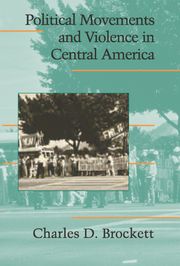Book contents
- Frontmatter
- Contents
- Figures, Tables, and Maps
- Abbreviations and Acronyms
- Acknowledgments
- 1 INTRODUCTION
- Part One From Grievances to Contentious Movements
- Part Two Opportunity, Contention, and Repression
- 6 CYCLES OF CONTENTION
- 7 CHANGING POLITICAL OPPORTUNITIES AND CONTENTIOUS CHALLENGERS: GUATEMALA
- 8 CHANGING POLITICAL OPPORTUNITIES AND CONTENTIOUS CHALLENGERS: EL SALVADOR AND CENTRAL AMERICA
- 9 CONTENTION AND REPRESSION: GUATEMALA
- 10 CONTENTION AND REPRESSION: EL SALVADOR
- 11 CONCLUSION
- References
- Index
11 - CONCLUSION
Published online by Cambridge University Press: 23 November 2009
- Frontmatter
- Contents
- Figures, Tables, and Maps
- Abbreviations and Acronyms
- Acknowledgments
- 1 INTRODUCTION
- Part One From Grievances to Contentious Movements
- Part Two Opportunity, Contention, and Repression
- 6 CYCLES OF CONTENTION
- 7 CHANGING POLITICAL OPPORTUNITIES AND CONTENTIOUS CHALLENGERS: GUATEMALA
- 8 CHANGING POLITICAL OPPORTUNITIES AND CONTENTIOUS CHALLENGERS: EL SALVADOR AND CENTRAL AMERICA
- 9 CONTENTION AND REPRESSION: GUATEMALA
- 10 CONTENTION AND REPRESSION: EL SALVADOR
- 11 CONCLUSION
- References
- Index
Summary
The relationship between popular contention and political opportunities generally, and repression specifically, has been of interest to political observers going back centuries, including some of the great theorists of the past. De Tocqueville, for example, in seeking explanations for the European upheavals initiated with the French Revolution, noted the paradox that carries his name, “it often happens that when a people which has put up with an oppressive rule over a long period without protest suddenly finds the government relaxing its pressure, it takes up arms against it…. Only consummate statecraft can enable a king to save his throne when after a long spell of oppressive rule he sets out to improve the lot of his subjects” (quoted in Oberschall 1995, 155).
One option open to the “king” when popular mobilization ignites following the opening of political opportunities is to reapply repression. Indeed, often this has been the response of rulers. Sometimes this heightened repression has succeeded from the viewpoint of “the throne.” But at other times it has aroused even higher levels of opposition and even an overturning of the throne itself. In the face of this repression-protest paradox, rulers have been advised by Machiavelli (paraphrasing): “if high coerciveness is applied, it should be applied consistently.”
This study has sought to build on such astute ages-old observations, as well as the findings of more recent scholarship, in order to bring a fuller understanding to these paradoxical relationships.
- Type
- Chapter
- Information
- Political Movements and Violence in Central America , pp. 324 - 328Publisher: Cambridge University PressPrint publication year: 2005

